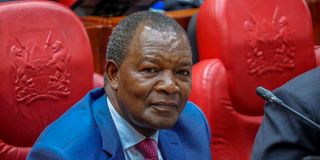Repayment of debts has bled country dry, Treasury now says

National Treasury Cabinet Secretary Njuguna Ndung’u when he appeared before members of the Finance and National Planning Committee at County Hall in Nairobi on Wednesday, November 8. He said the country is facing short-term liquidity constraints due to the maturing debt.
What you need to know:
- If interest rate structure remains high, it will be difficult for Kenya to enter the market for cheap loans.
- Treasury is facing underlying pressures like the rising cost of living and high taxation.
The country is beset by cash-flow challenges due to payment of maturing debts, delaying disbursement of funds for development projects, the National Treasury has said.
Treasury Cabinet Secretary Njuguna Ndung’u told the National Assembly Finance and National Planning Committee that the country is in dire straits.
“We have been pushed to a difficult financial position by short term debt repayment, high interest rates and the depreciating shilling, which has increased our expenditure by Sh145 billion” Prof Ndung’u said, assuring, however, that “we are not facing an insolvency crisis.”
Prof Ndung’u appeared before the committee chaired by Molo MP Kuria Kimani to defend Treasury’s budget cuts contained in Supplementary Estimates I.
He said the country is facing short term liquidity constraints due to the maturing debt. Prof Ndung’u said Treasury is also facing a number of underlying pressures like the cost of living and high taxation.
“People have been telling us to reduce the taxes. However, the cost of living arises due to supply side problems. Inflation came down to 6.9 per cent and the same is exacerbated by the high cost of fuel,” Prof Ndung’u said.
“The Energy and Petroleum Cabinet Secretary Cabinet Secretary Davis Chirchir indicated that fuel prices could hit Sh300 per litre in Kenya should the war between Israel and Hamas continue,” Prof Ndung’u said.
“The adjustment for exchange rate and interest rate structure for the United States has been devastating to us,” he added.
Prof Ndung’u said the exchange rate and interest rate has ballooned the public debt by between 4.3 per cent and 5.2 per cent increasing the debt by Sh145 billion in the first quarter of the financial year.
Also Read: Sh1,000 buying power dips to Sh850 in a year
Mr Chirchir on Monday told the ongoing National Dialogue Committee hearings that, while rising fuel prices are a global issue, the government's interventions had mitigated a further rise in pump prices.
“We can't do much on international pricing of petroleum. I read an article that international (crude) prices could go to $150 (per barrel) because of the Israel-Hamas war, which would literally mean our products going to a high of Sh300 per litre at the pump. We hope it doesn't get there," said the CS.
Prof Ndung’u told the MPs that the interest rate structure will continue to be high and this will make it difficult for Kenya to enter the international market for cheap loans. He said Kenya is preparing to make a bullet payment of Sh300 billion for the Eurobond in June next year.
“The elephant in the room is the Eurobond payment of $2 billion. The payment is coming in June and everyone is asking if Kenya will be able to pay,” said Prof Ndung’u.
“I was in Marrakesh in Morocco for the annual meeting of the International Monetary Fund (IMF) and the World Bank Ministers for Finance and I convinced them that we can’t default on public debt. I have to make sure that whatever it takes, we will pay the Eurobond.”
Prof Ndung’u said that, for Treasury to remove the risk of default, the government will buy back some portion of the Eurobond.
“Everybody believes that the government will go and buy dollars and pay the Eurobond. To reduce the jitters, we will buy back some portion of the Eurobond,” Prof Ndung’u said. He said the IMF and the World Bank have indicated their willingness to help the country repay its debt and reduce liquidity challenges.
Treasury Principal Secretary Chris Kiptoo said the country is walking a tight rope and has resorted to budget cuts to control spending.
“We are in a very tight situation. We have seen a Sh145 billion increase in the budget due to interest rate and the depreciating shilling,” he said. “But we are likely to get between $4 billion to $5 billion from the IMF and WB and other donors by June next year.”





